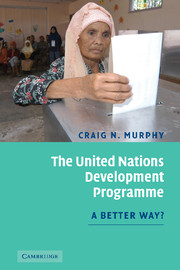Book contents
- Frontmatter
- Contents
- List of figures
- List of tables
- Foreword by Kemal Dervis
- Acknowledgements
- 1 Not the standard image
- 2 Development and the United Nations
- 3 Institutions for practical solidarity
- 4 Decolonization and economic transformation
- 5 Lewis in Ghana and after
- 6 Capacity, consensus, crisis, and consequences
- 7 Engaging liberation movements and revolutionary states
- 8 A learning organization: women, Latin America, and Africa
- 9 ‘Bottoms up’ development helps make UNDP a mammal
- 10 Working for ‘a holy man’ after the cold war
- 11 ‘Fabian socialists do not make the cut’
- 12 ‘Ploughing the sea’? UNDP and the future of global governance
- Index
1 - Not the standard image
Published online by Cambridge University Press: 08 January 2010
- Frontmatter
- Contents
- List of figures
- List of tables
- Foreword by Kemal Dervis
- Acknowledgements
- 1 Not the standard image
- 2 Development and the United Nations
- 3 Institutions for practical solidarity
- 4 Decolonization and economic transformation
- 5 Lewis in Ghana and after
- 6 Capacity, consensus, crisis, and consequences
- 7 Engaging liberation movements and revolutionary states
- 8 A learning organization: women, Latin America, and Africa
- 9 ‘Bottoms up’ development helps make UNDP a mammal
- 10 Working for ‘a holy man’ after the cold war
- 11 ‘Fabian socialists do not make the cut’
- 12 ‘Ploughing the sea’? UNDP and the future of global governance
- Index
Summary
In 1971 two Chilean activists – a literary critic and a sociologist – created a cartoon character, Cabro Chico (the ‘Little Kid’), to challenge the comic book monopoly of foreign multinationals and poke fun at the opposition to Salvador Allende's democratically elected Popular Unity government. Allende's overthrow in 1973 brought prosperity (for a few) and a tragic seventeen-year dictatorship. In 1971 Allende's opponents already ranged from entrenched economic elites to international development agencies that withheld loans needed for his programmes of mass education and agrarian reform.
In what became an international bestseller, How to Read Donald Duck, the same professors-turned-cartoonists reprinted a Disney strip that made the connection between complicit, incompetent elites and unreliable global agencies just as effectively as the exploits of Cabro Chico had. In the strip, smiling to an absurdly masked ‘native’ leader, a surprised Donald Duck says, ‘I see you have an up-to-date nation! Have you got telephones?’ The reply: ‘Have we gottee telephone? Of course! Only trouble is only one has wires! It's a hot line to World Loan Bank!’
The Disney cartoon conveyed a standard image of international development cooperation in many circles, on the libertarian right just as much as on the egalitarian left. That image makes another comic book, drawn a generation later and a continent away, particularly surprising. Kenyan cartoonist Terry Hirst is known for defying his country's land barons, their offcial protectors, and their foreign friends, including some of the most powerful international development agencies.
- Type
- Chapter
- Information
- The United Nations Development ProgrammeA Better Way?, pp. 1 - 26Publisher: Cambridge University PressPrint publication year: 2006



